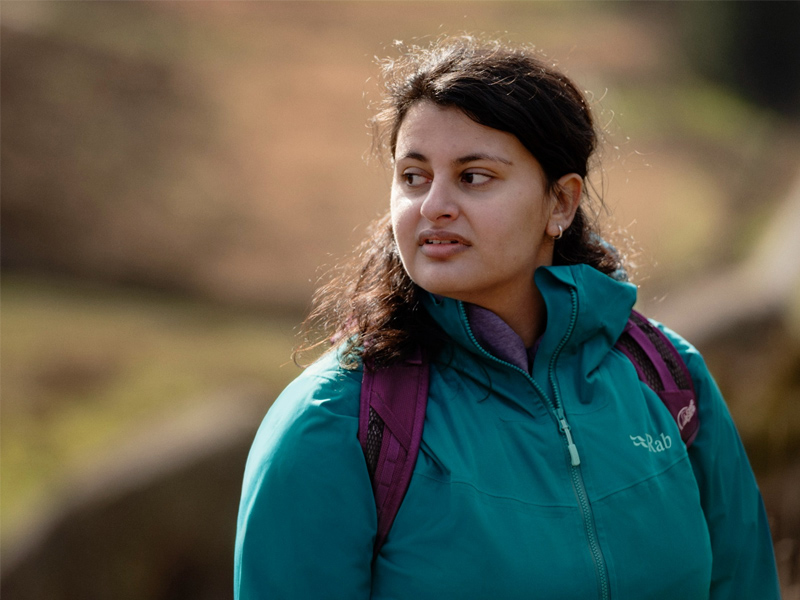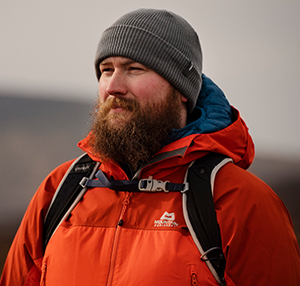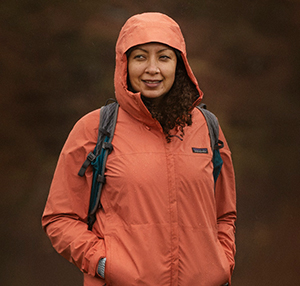Outdoor Voices | Interview with Ani Went Outside
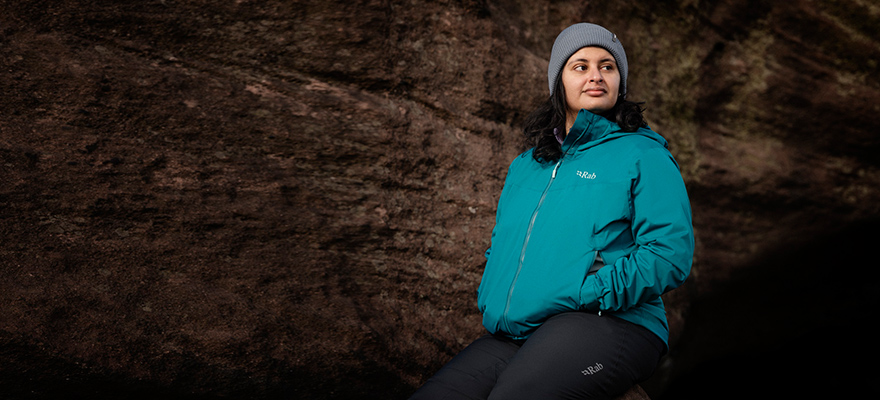
Ani Barber, founder of Outside Our Way, shares her experience as a disabled adventurer and outdoor disability advocate.
Ani discusses her love for the outdoors and her efforts to create a supportive online space for disabled and chronically ill individuals to share their own narratives of outdoor experiences.
Learn more about how we’ve teamed up with Ani to promote the importance of accessibility as part of The Accessible Outdoors Guide, in partnership with This Expansive Adventure.
__________
ANI: "Hi, I’m Ani Barber, I’m a disabled adventurer and outdoor disability advocate with Lupus, Fibromyalgia and HSD. After years of being afraid to leave the house, I started going outdoors in 2019. I’m the founder and writer for Outside Our Way where I meet individuals from across the outdoor sector and disability landscape to share their stories. The goal is to create an online space for disabled and chronically ill people to shape their own narratives of outdoors experiences."
EB: “Take us back to the beginning. When did your love for the outdoors first start?”
ANI: “My love for the outdoors first started in 2019 when I went on an angry hike because I was sick of feeling limited and never leaving the house and I just snapped. That led to wonderful feelings and outdoors addiction.
I was diagnosed at a young age and I found it hard to access anything in life without problems. This made me feel more and more isolated. I just ended up just staying indoors and doing nothing, literally being afraid to go to a restaurant or celebrating Eid or anything.
Then one day, I was just having a really bad day where I was sick of asking the doctors for help with my pain, and I was just like, “ well sod it, if I'm gonna be in pain then I'm not gonna stick around here for it”. I waddled off on a very short hike in Youlgreave, and I felt dead after it - but it really got me hooked.”
"The idea is to be able to support people who are chronically ill or disabled already, and encourage people to start being allies in that community.”
(Photo Credit: This Expansive Adventure)
EB: “Could you tell us a little bit more about what you're doing now? What you're involved in and why did you get into what you're currently doing?”
ANI: “Currently, I am involved in being a disability campaigner in the outdoors, trying to focus on access, inclusion and awareness.
It started when I was coming to discover my own ways of accessing the outdoors. I came across some really knowledgeable people who had already done what I was doing and had tips for me to do it better. So I felt like that needed to be shared more and needed to be common knowledge. It shouldn't be so hard to find information about access.
I now write a blog called ‘Outside Our Way’ which features the stories of disabled and chronically ill folk. It asks them questions like, “what do you enjoy about the outdoors?”. “Tell me a bit about your disability or chronic illness and how it impacts you in the outdoors”. “Has it ever prevented you from doing something?” Then there's always a section of what tips would you give to other people with similar conditions to yours. Then what tips would you give to people who are non-disabled and chronically ill to help them know how to improve access.
The idea is to be able to support people who are chronically ill or disabled already, and encourage people to start being allies in that community.”
EB: “So what is ‘All The Elements’ and how is Outside Our Way involved?”
ANI: “‘All The Elements’ is the website that hosts ‘Outside Our Way’. They also host the disability campaigner socials that I host, which is a networking platform where lots of people who are already in the disability campaigner space work together and talk about how we can cover all the different areas.
Disability is such a diverse sector. Neuro divergence, wheelchair users, hidden disabilities, visual impairments . It's very diverse and I felt it was important having more voices than just mine.
In general, All The Elements encompasses all the different areas of diversity and tries to encourage and support those with the work that they're doing and get their voice out there. Getting them in contact with the right people, or providing support and advice for projects they might be working on.
The entire thing is uplifting people who are doing the work already. Putting people in contact with each other to help each other. It's great work, it does really well. And it's got a massive community at the moment.”
EB: “What do you think some of the barriers are that are stopping people with disabilities from talking to others in the first place?”
ANI: "I think historically, a lot of the discussion around disability has been, "I have this disability. But I overcame it by doing this massive challenge”. Those are amazing & inspiring stories that have inspired me to push my boundaries. But I feel that’s the main narrative you tend to see because it's more appealing for readers to read; somebody successfully overcoming their limitations and boundaries. But that's not always the case or the reality.
Often we have to live within our limitations and boundaries quite happily. That's the reality I want to put out there.
That's the thing we need to normalise more within the wider outdoor community. Especially to those who are new to it. I get a lot of people messaging me like, “I've got this condition, how did you get into hiking?”
Until you're involved, you don't know people who are already doing the work in disability campaigns. You've got to get there first.”
"Often we have to live within our limitations and boundaries quite happily. That's the reality I want to put out there."
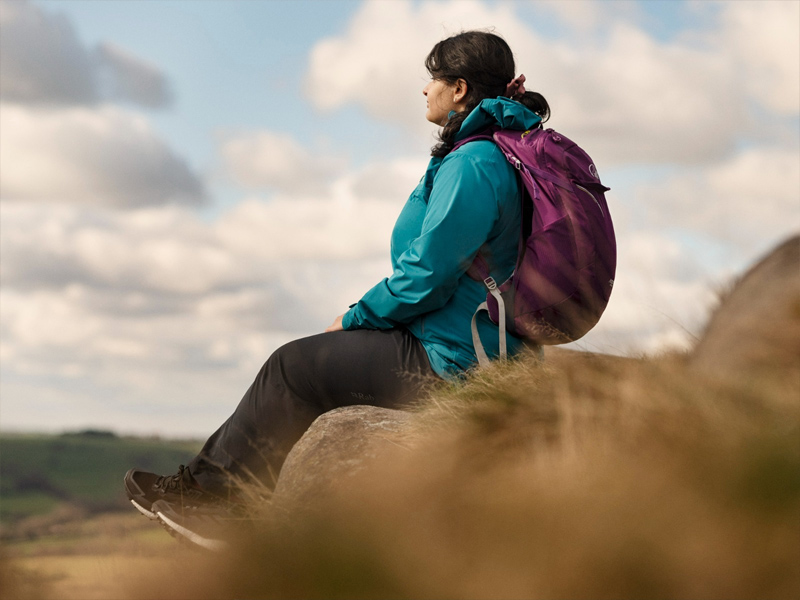
(Photo Credit: This Expansive Adventure)
EB: “Has your opinion of accessibility in the outdoors changed over time since you've been able to access a larger community?”
ANI: “I think since being more involved in the disability campaigner movement, one voice isn't enough. Two voices aren't enough. There's just a wealth of people with different lived experiences and it's very important to include all of those.
I think the more I've engaged in the outdoor community in this specific way, the more I'm finding people with completely different barriers to me.
Even in the disability advocacy community, there are people with things that aren't being talked about and discussed. There are people who feel completely left out of the conversation.
There’s pressure, both internally and externally, to look at ways how we can adapt things to make them more accessible. Even at the festivals and events that are big staples in the outdoor community. Everybody feels like they need to attend at least one, but that can be completely inaccessible for some.
That adds to the exclusion of that community being fully part of the outdoors community. I've realised there are subtle ways that the outdoors is a little bit less inclusive than you think.”
There has been a lot of movement in recent years to make sure events are as accessible as possible. What are some ways outdoor events could make their offering more accessible?
EB: “What are some of the positive changes relating to disability awareness in the outdoors that you have seen addressed in recent years?”
ANI: “I'm definitely seeing more hidden disabilities getting platforms, which is nice.
You're also seeing people like Debbie North involved in government-level talks and conversations and accessibility really is becoming a thing now with this movement going forward. You are seeing it progress, you are seeing it grow and expand and get more attention, more engagement and really being pushed forward. That's a really positive thing to see.
You're seeing things like actual changes being made, like Trampers being available in some of the national parks. There are accessible water sports groups, like wild swimming groups on Facebook. You're seeing things being put out there and accepted by the general outdoor community and changes being made slowly but surely.”
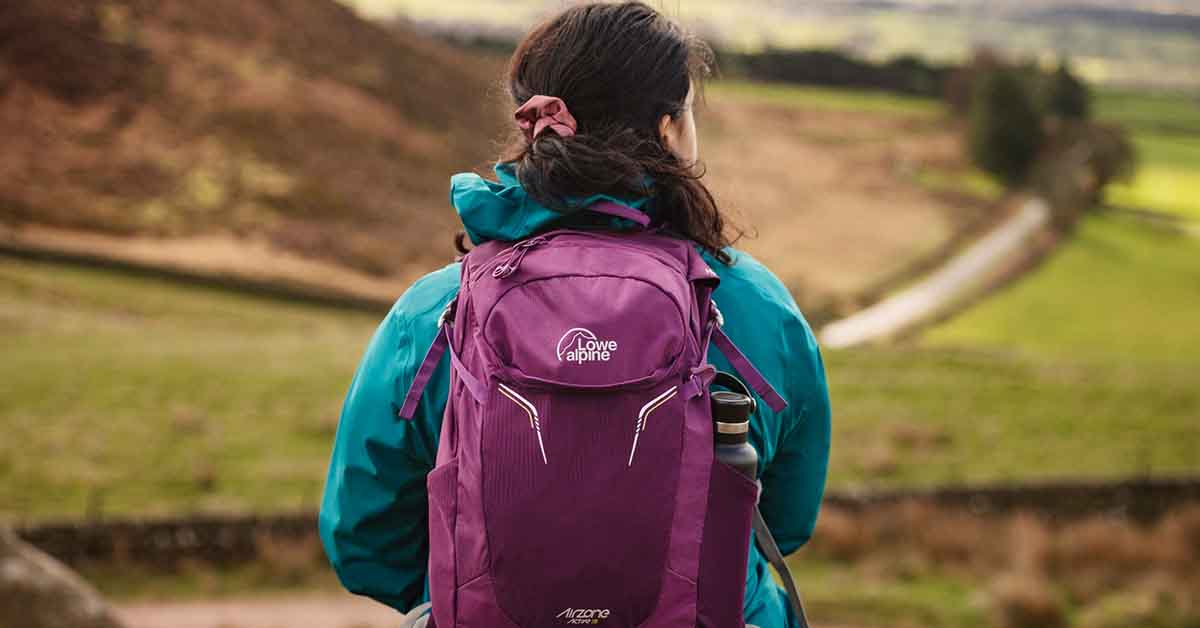
(Photo Credit: This Expansive Adventure)
EB: “Are there any particular issues you feel need more visibility and awareness?”
ANI: “I think it's still very ‘overcoming orientated’ and I think we need to move away from that. We need to understand that something that might seem of average ability to a non-disabled or non-chronically ill person may actually be a massive challenge and a scary thing to do for somebody else with a disability or a chronic illness.
What you’re seeing in films, or in advertising, is all about these epic stories, but it’s really not the reality for everyone. It can feel very invalidating.
I also think people with learning disabilities and neurodivergent people are really not getting the attention they need. And though hidden disabilities are getting quite a bit of visibility as well now, I still think that is a space that's being missed.”
EB: “What needs to be done at a national level to enable disability awareness and knowledge exchange to the wider community?”
ANI: “It would be nice to see organisations with bigger reaches really advertising and supporting these groups that are doing the work publicly. I think that would bring a massive uplift to it.”
“In the outdoors, accessibility means to me being able to access nature and the outdoors, however suits you and however your body can do that.”
EB: “What can we all do to become better disability awareness advocates?”
ANI: “Listen to the stories that are already out there. There are people already sharing their stories, whether it's on Instagram, on blogs, or in books. Take the time to just get that extra bit of knowledge.
If you've not got the time to sit down and read something extensive, follow somebody, you can pick up little things. Read Outside Our Way and in five minutes you can get somebody's story about their disability that they're currently going through.
I think that will help you understand what sort of questions you need to ask to be considerate of somebody's needs. But then also, learn to understand that everybody's story is different and that you do need to be considerate of an individual's needs.
We also need more consultancy with disabled folk on an organisational level. Disabled folk need to be part of the consultation process from the beginning, not as an afterthought later when somebody complains they can't get their wheelchair onto the park.”
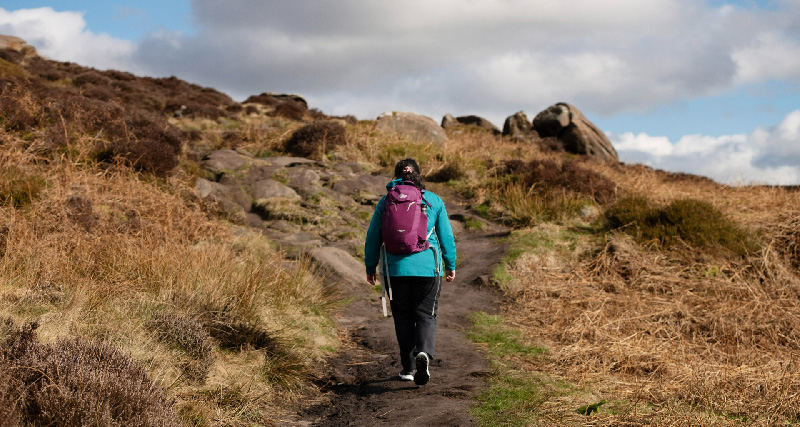
(Photo Credit: This Expansive Adventure)
You can find out more about ANI WENT OUTSIDE by following her on Instagram and the Outside Our Way Blog.
For recommended resources and support in the outdoors, check out the All The Elements Directory.
__________
The Accessible Outdoors Guide
We believe that the great outdoors is for everyone, without exception.
But concerns about safety, accessibility, or lack of representation can prevent some from fully embracing outdoor adventure. That’s why we’ve partnered with This Expansive Adventure to create The Accessible Outdoors Guide – bringing together leading voices in the outdoor community to break down barriers in Safety, Accessibility and Diversity.
Join us in making outdoor adventure open and accessible to all.


